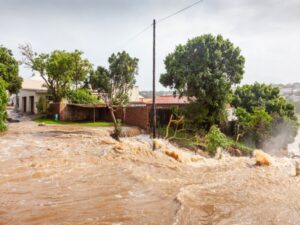The recent flooding in KwaZulu-Natal have had a huge impact on businesses operating in South Africa in general and especially those operating in the province. Apart from lost productivity, there has also been significant damage to infrastructure.
Shumani Industrial Equipment, which recently started operating in KwaZulu-Natal to capitalise on opportunities in materials-handling equipment for the port sector, was not spared either. Shumani currently supplies port equipment to Transnet Freight Rail and Transnet Port Operations on a short-term rental basis. MD Victor Nemukula said that damage ranged from sensitive electronic components to the larger equipment for ports and even forklifts. “We are still assessing the total extent of our losses. As some of our equipment is on a short-term rental basis, it means that for each day we are not operating, we lose income. This also affects our customers in that they need to rapidly move product from Durban Port to inland.”
The torrential rain caused extensive damage to houses, businesses, roads, bridges and water, electricity, rail, and telecommunications infrastructure. Cabinet declared a national state of disaster on 19 April. KwaZulu-Natal Premier Sihle Zikalala estimates it will cost about R5.6 billion to repair the damage to road infrastructure alone. While Durban Port, one of the largest and busiest shipping terminals on the continent, has since reopened, there is a massive backlog of 8 000 to 9 000 containers.
With the province having just gotten back onto its feet after the looting and unrest in July 2021, the latest flooding could not have come at a worse time. Shumani itself managed to escape the brunt of the events last year, but some of its larger customers were directly impacted in that their businesses were vandalised. “The immediate impact was a knock-on effect on payments, as some customers were unable to operate on various sites. We could not invoice while the situation persisted, which translated into several months of under-recovery,” said Nemukula. Despite a state of disaster being declared to deal with the situation in KwaZulu-Natal, Nemukula is optimistic about the future. “The past 12 months have been exciting. We were able to show significant growth and keep our existing customers. We were also able to diversify the business by making inroads into the port-handling, mining, and construction sectors, among others,” he concluded.





